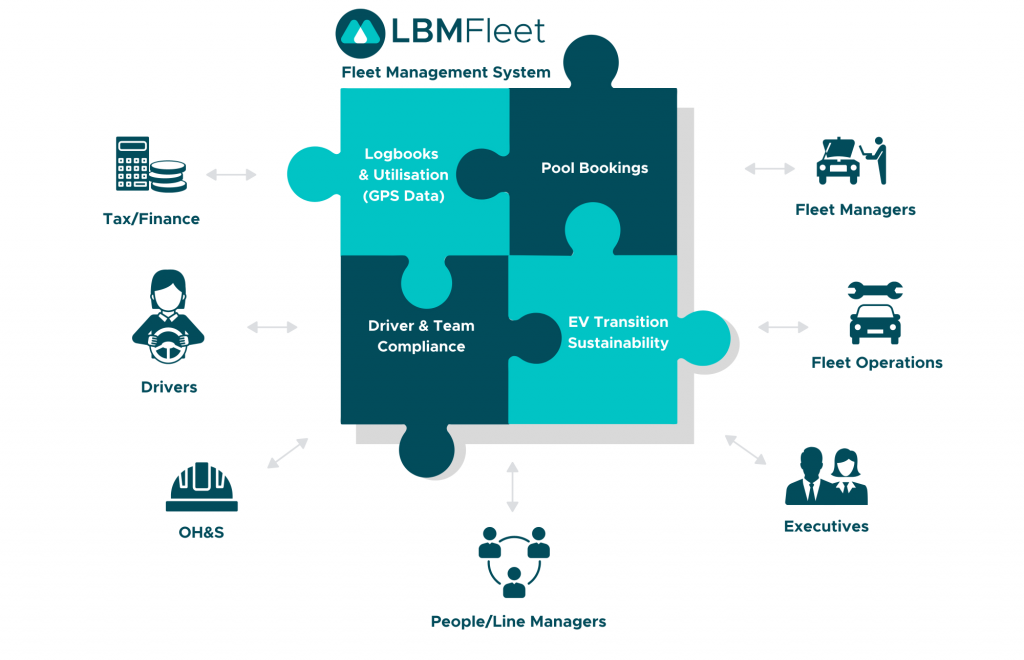
How an Integrated Booking System Can Optimise Your Fleet
Are your fleet vehicles constantly ‘booked out’, but your carpark is full?
Do your employees book in vehicles for the day, but only use them for 30 minutes?
Do you know how many vehicles you really need in your fleet to satisfy your operational needs?
Or are you unsure of how that would be calculated in the first place?
Fleet management doesn’t have to be complicated. Today, Fleet Managers can have complete insight into how their employees book, use and drive pool vehicles. Gone are the days of online calendars being constantly booked out, yet garages being fully packed. An integrated booking system puts all the pieces of the puzzle together to optimise your fleet.
LBM Fleet’s integrated booking software works seamlessly, to create the most effective and useable booking system possible for your fleet. For too long, it has been common practice (or mistake) that fleet vehicles are booked, with no context surrounding the use. Vehicles that are booked in for use by employees using out-dated, limiting methods, such as Outlook calendars, hinder optimisation and potentially lead to a lack of sustainability, accountability and increased, unnecessary operating costs for businesses. Furthermore, do any of us really believe that employees manually capturing odometer readings is the best way of tracking this information?
With an integrated booking system, bookings are linked with logbook GPS data to evaluate how fleet usage complies with company policy, providing context and full data transparency to fleet managers and ultimately, making your job easier to do!
One Integrated Platform

These components collaborate to achieve a seamless integration that brings transparency, compliance, and optimisation benefits to your entire organisation.
LOGBOOKS & UTILISATION (GPS)
- All trips made under a booking are captured
- Easy trip classification
- GPS tracks vehicles
- Not used
- Returned late/early
- Pick-up late/early
- Driven with no booking
POOL BOOKINGS
- Online bookings
- Rules based
- Live odometer reading when cars are assigned
- Includes cost-centre charging
- Linking booking to Driver ID and PIN generation
DRIVER & TEAM COMPLIANCE
- Vehicle usage policy
- Compliance by driver
- Rules for safety, driver behaviour, fatigue, bookings, business/private use
- Overlay of telematics data to policy settings
EV TRANSITION & SUSTAINABILITY
- Reduction of CO2 emissions
- Fleet reduction
- Identifying (via GPS data and usage) which users and vehicles should transition to EVs.
How does an integrated booking system work?
The key functionality of an integrated booking system is to create an efficient and effective booking system by combining data from not only bookings, but also trips.
An Integrated booking system can help identify:
- Vehicles that are booked in by drivers but not driven. This effectively prevents other drivers from booking and using a vehicle, that is otherwise sitting idle – and can incorrectly convey the need for more vehicles in your fleet that are regularly available. An integrated booking system will identify this loophole and help to reduce fleet size, dependent on vehicle use, rather than vehicle bookings.
- Vehicles that are taken without being booked. In this case vehicle use is not accounted for, and possibly impacts those who have booked the vehicle when they are trying to find a vehicle which isn’t there.
- Vehicles that are returned late. This can negatively impact other bookings, staff and clients as booked vehicles are unavailable for use when returned late.
- Vehicles that are returned early. This can also hinder the booking process if not properly logged, as vehicles that are available can be deemed unavailable if returned with allotted time left over.
- Vehicles that are picked up late. Picking up the vehicle late also skews the data around vehicle usage, in effect, generating an inaccurate representation of operational efficiency.
An integrated booking system can address these issues by tracking vehicle usage and ensuring that vehicles are only booked and used when needed. By incorporating GPS tracking, the system can accurately capture vehicle routes and monitor where they are picked up, returned, and driven. This allows for better management of fleet resources and prevents unauthorised use of vehicles.
Furthermore, suitable vehicles can be identified for EV replacement based on vehicle usage and actual operational needs of your business.
As well as identifying the above, an integrated booking system applies a plethora of other advantages that increase the efficiency of your fleet, and business more broadly:
Telematics & Driver ID
Where the vehicle is.
Who is driving the vehicle.
How long the vehicle is used.
Live odometer from GPS.
Can only see the vehicles that are booked, no data on:
If the vehicle was even driven.
If the correct vehicle was taken
Where the vehicle was driven.
How long the vehicle is used
Who drove it.
Employees required to manually enter odometer reading.
Key Management
Key management integration allows only the correct driver to access the vehicle they booked in.
No key management allows drivers to take any vehicle/keys. Lack of transparency and accountability over who drove what vehicle and can negatively impact operational process and driver safety.
Policies
Missing keys, wrong vehicles taken, missing vehicles, Late pick ups / returns etc.
Able to link all the data back to policy and measure compliance levels.
Can implement policy and address non-compliance.
Data establishes a baseline from which sustainability initiatives can be launched and measured.
No way to measure compliance levels.
No data to enforce or back up policy or new initiatives on pool fleet use.
An integrated booking system is perfect for organisations that heavily rely on their fleets and require increased visibility and accuracy of data. This data-driven approach allows for informed decisions about fleet reduction, leading to cost savings and environmental sustainability. Not only does it ensure better resource management, but it also helps optimise your fleet and ultimately, your business.
How can an integrated pool booking system help optimise my business?
Integration over the above key elements is powerful – it completely optimises your fleet, so that your business can operate in the most sustainable, efficient and safe way it possibly can. An integrated booking system is essential in determining the right size of your fleet, as well as increasing accountability throughout the team, from driver to manager.
Without integrated trip data (combining bookings with logbook trip information), it is impossible to determine how large, or how lean, your fleet should be. An integrated booking system will identify vehicles that are being under-utilized, to determine which vehicles are essential for your fleet to run smoothly, and which can be removed or transferred across the organisation. By reducing your fleet to the right size, not only are you increasing the sustainability of your business, but reducing costs. The flow on effect from a reduction in fleet size can also lead to savings that can be used to fund the transition to EVs.
By increasing the accountability that is placed on drivers, and in turn, raising the level of transparency across the business, both drivers and fleet managers are empowered to utilise fleet vehicles in a conscious and considerate manner. Integrated booking systems aid in so much more than simply clearing up the booking calendar. The data gained by integrating bookings with trips unlocks opportunities to save on costs, increase sustainability, promote policy compliance, and above all, make the job of fleet managers more streamlined.
If you’d like to find out more about our integrated pool booking system, get in touch with our Customer Solutions team today.

